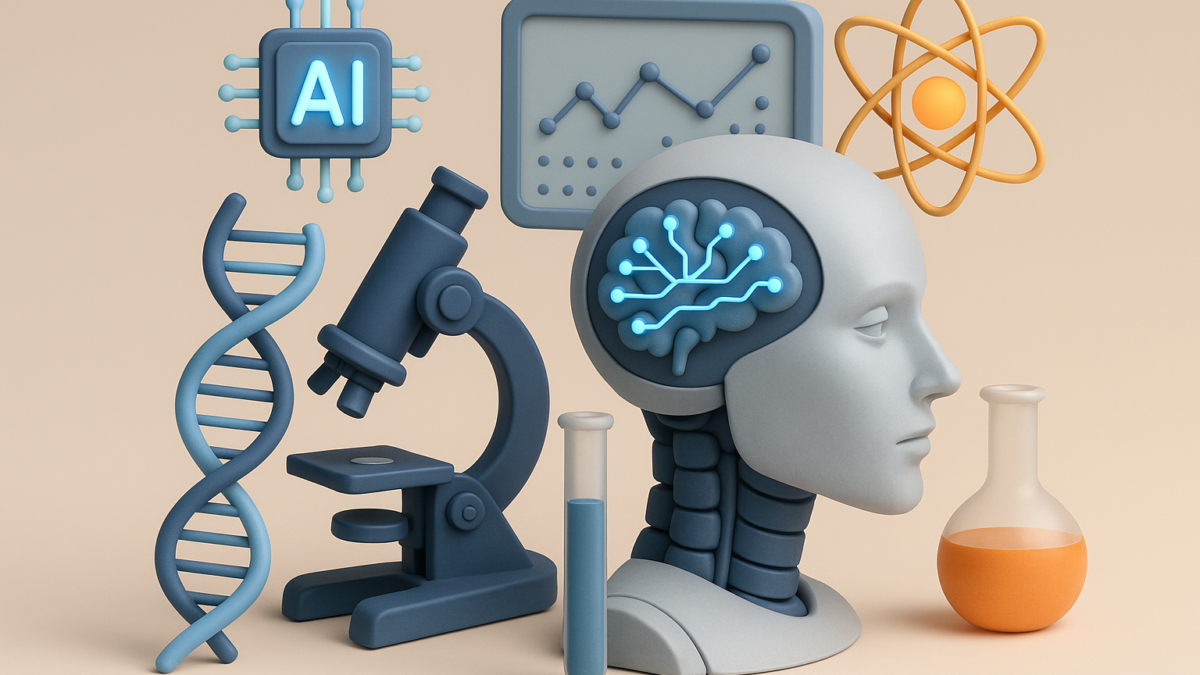AI in Research: How Artificial Intelligence Is Redefining Discovery in 2025
Table of Contents
Introduction: The Dawn of AI-Powered Discovery
In 2025, research no longer depends solely on human intuition, manual data analysis, or years of incremental progress. Artificial intelligence (AI) has become a powerful engine driving discovery in science, healthcare, academia, and business.
From predicting protein structures to accelerating drug development and analyzing global climate data, AI is shortening research cycles from decades to months. The result? Faster breakthroughs, smarter insights, and a new era of knowledge creation.
Why AI Matters in Research Today
Research has always faced two big barriers: data overload and time constraints. With global datasets doubling every two years, human researchers cannot possibly process information at scale.
AI solves this by:
- Automating repetitive analysis (sorting, classification, simulations).
- Identifying hidden patterns across complex datasets.
- Generating hypotheses that humans may overlook.
- Speeding up validation through predictive modeling.
The outcome: scientists and business leaders spend less time crunching numbers and more time asking better questions.
Applications of AI in Research
1. Healthcare & Life Sciences
- AI models like AlphaFold have cracked protein folding, enabling drug discovery at unprecedented speed.
- Machine learning algorithms identify potential compounds, reducing costs in pharmaceutical R&D.
- Clinical trials leverage AI to match patients faster and analyze results in real time.
2. Climate & Environmental Science
- AI supercomputers process satellite and sensor data to forecast climate patterns.
- Helps governments and NGOs design data-backed sustainability strategies.
3. Academic & Business Research
- AI assists researchers in literature reviews, summarizing thousands of papers in minutes.
- Tools like ChatGPT, Claude, and domain-specific models help generate structured research proposals.
- Businesses use AI to predict market shifts and consumer behavior, reducing reliance on outdated trend analyses.
4. Social Sciences & Humanities
- AI analyzes historical texts, social media, and cultural datasets to uncover sentiment shifts.
- Enables sociologists and policymakers to design interventions backed by real-world behavioral insights.
Benefits of AI in Research
✔ Speed: What took years can now take weeks.
✔ Accuracy: Reduces human error in large-scale data analysis.
✔ Cost Savings: Lowers R&D expenses, particularly in pharmaceuticals and climate modeling.
✔ Scalability: Handles terabytes of data across multiple domains simultaneously.
✔ Collaboration: AI-powered platforms allow global teams to share and analyze data seamlessly.
Challenges & Ethical Considerations
Bias in AI Models
If training datasets are skewed, research outcomes may reinforce inequalities.
Over-Reliance on AI
Blind trust in algorithms without human oversight risks flawed conclusions.
Intellectual Property & Authorship
Who “owns” AI-generated insights—developers, researchers, or organizations?
Transparency & Explainability
AI “black box” models often provide answers without showing how they arrived at them, challenging peer review.
Case Study: AI in Drug Discovery
In 2023, DeepMind’s AlphaFold predicted the structure of nearly every known protein, a feat scientists estimated would take decades using traditional methods. By 2025, pharmaceutical companies have integrated AI to reduce early-stage R&D costs by up to 40%, accelerating treatments for rare diseases and global health crises.
The Future of AI in Research (2025 & Beyond)
- AI as a co-author: Journals are debating whether AI should be credited in research publications.
- Quantum + AI fusion: Quantum computing will supercharge AI models, unlocking insights in physics and chemistry.
- Democratization of research: Cloud-based AI tools will enable smaller institutions to perform world-class research.
- AI in business R&D: From fintech to martech, enterprises will use AI to accelerate product innovation.
Connecting the Dots: AI Beyond Research
AI isn’t just redefining laboratories and universities. It’s also transforming everyday productivity. For example, Cluely: The Invisible AI That Thinks for You in Every Meeting shows how AI can act as a second brain in the workplace, offering real-time insights and follow-ups. The same principles of automation and augmentation are fueling innovation across every sector.
Conclusion: A New Era of Discovery
AI in research isn’t replacing scientists—it’s amplifying them. By handling the heavy lifting of data analysis, hypothesis generation, and simulation, AI frees human researchers to focus on creativity, critical thinking, and ethical decision-making.
In 2025, the organizations that embrace AI in research will unlock faster innovation, tackle global challenges, and create breakthroughs that shape the future of humanity.
CTA
Want to stay updated on how AI is transforming research, finance, and the future of work?
Subscribe to iTMunch for weekly insights into the technologies driving the next wave of discovery.
You May Also Like: The Silent Salesperson: How Whitepapers Influence B2B Buying Decisions Without a Pitch





